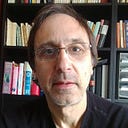Book review: The Trouble with Being Born, by Emil Cioran
When you’re stuck at home waiting for your cold to go away, the question inevitably arises: what am I getting up for?
A few days ago I thought I’d found the answer. I decided to read as many books as possible, perhaps a one a day, and blog about them.
This quest for purpose, however vain, is understandable. What is strange is that I haven’t used the extra time to deepen my practice of meditation. In the morning, I usually sit with my eyes closed and focus on my breath for 30 minutes before going about the day’s business.
No longer. In order to meditate, it seems, I need urgent matters to postpone.
Yesterday I was still having breakfast when I started wondering what book to read next. Scanning the bookshelves, I spotted Cioran’s Oeuvres. I put down my bowl of muesli, opened the volume at random and read this:
“Granted, I am not doing anything. But I see the hours go by, which is better than trying to fill them.”
I thought: here is a man who is wiser than me — which, however low a bar that might be, made him worth delving into.
In the past, I had dipped in and out of Cioran’s books, most of which are collections of aphorisms about how pointless life is. Now was the time to read one from beginning to end.
I chose De l’inconvénient d’être né (The problem with being born), which contains the above quote. Many of the early entries were variations on the advertised theme:
“We are not racing towards death; we are running away from the catastrophe of our birth; we are survivors struggling to forget it. Fear of dying is only the projection into the future of a fear that dates back to our first moment of life.”
“I know that my birth is fortuitous, a laughable accident, and yet, as soon as I forget myself, I behave as if it were a capital event, indispensable to the functioning and equilibrium of the world.”
“Not to be born is unarguably the best formula there is. Unfortunately, it is beyond anyone’s reach.”
At first I found these and others in the same vein bracing. But as apophthegm followed bleak apophthegm, the bleakness began to feel contrived:
“Physical need for disgrace. I would have liked to be the hangman’s son.”
“To have committed every crime, except that of being a father.”
“Sometimes I wish I were a cannibal — less for the pleasure of eating someone than for the pleasure of vomiting him.”
In the end I had to stop. It’s not just that I belatedly understood that this type of book is not meant to be read in one go — deep down I knew that.
I realised that reading on was taking me ever further from what Cioran was saying. Abandoning the book, conversely, was a way of acknowledging his call to see the hours, not fill them. Therein, perhaps, lies the path back to meditation.
